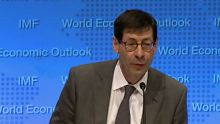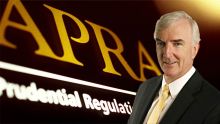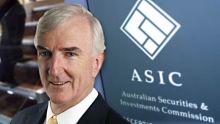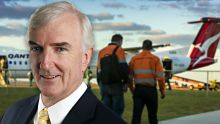This Queensland couple just bought a house, paying for it in full with more than $400,000 cash.
"It's across the road from the water. We call it our million-dollar view without the price tag," Monique Kinerson, 45, says of the Gold Coast property.
More Business Week Videos
There's no housing bubble ... in some places
No, Australia isn't suffering a housing bubble. Sydney and to a lesser extent Melbourne might be, but the whole nation is starting to pay the price for it.
They're a phenomenon in a country that owes about $32 billion on credit cards. We owe banks an average of $4300 per card holder, according to the Australian Securities and Investments Commission.
Kinerson, who works part time as a consultant in the health space, admits the couple make a game of saving. "We joke that we're living beneath our means."
The couple and their young child almost never eat out and buy mostly second-hand rather than new. They collect and use discount vouchers, they don't have the internet connected at home (only using the data on their phones) and even turn off appliances at the power point.
"We also negotiate interest rates with the banks on our small mortgage in Sydney. Sometimes the bank agrees to reduce our fees for three months, but I diarise to call them after that time and renegotiate. They quibble a bit, but I go in with evidence that I can get a cheaper rate elsewhere, and I'm always prepared to move, and it works. I've only had to move banks once. We do the same with insurance. If you don't ask, you don't get."
The Queensland training manager has always been a saver, having been raised in a single-parent family.
"We were always watching out for money. There was no way my mother would have been given a credit card by a bank back in the 1970s, and we never bought something new out of the blue. I guess it just rubbed off."

While some Australians know their parents are a realistic financial back-up plan, Kinerson just knew she'd have to look after herself financially.
She started a corporate training business at 35. "While I was struggling to get my first client, I never worried about paying the bills, as I always had saved enough to last a year, just in case."

Growing up, Rachel Smith never saw anyone with a traditional income. Her parents and grandparents were all self-employed. She describes her parents as financially organised and conservative.
"I never saw someone in a traditional job, getting paid the same amount every week. I think that changes your attitude, because you see the financial results of hard work."
My no buying experiment really enforced that we need very little to be happy.
Rachel Smith
Smith helped her mother document household expenses in an exercise book each week. "Mum was very open about expenses. She treated running the household like running a business," the Brisbane saver says.
Smith had two jobs by the age of 13. "I've always been a bit frugal. As a kid I'd write down what I wanted to buy on a three-month waiting list. If I still wanted and needed the item after three months, I bought it. Nine times out of 10, I no longer wanted or needed it. My no-buying experiment really enforced that we need very little to be happy."
In 2013, Smith set herself a goal not to buy anything new, but failed by late April. She tried again in 2014 with a new mindset, and succeeded, saving about 38 per cent of her take-home salary - tens of thousands of dollars.
In 2015, when she took a redundancy as an engineer, she already had more than two years' worth of salary in a long-term savings account.
"I bought a house in Brisbane where I live, and paid for half of it in cash," the contract transport engineer says.
Smith published a book called Underspent about breaking her shopping addiction, released in 2015. She also recently launched a 10-week online program that helps people change their spending habits. Sixty people are doing the course, which is in Beta testing.
Brisbane man Ross Marais also adopted saving habits early, stashing away $4000 on minimum wage as a university student for a six-week African holiday.
He was taught the value of money by being paid a small sum for doing chores around the house from the age of 10.
"This taught me how money is exchanged in the real world, and I've always been willing to save for something larger."
Marais has forged a career in financial planning with his father, launching a business together in Brisbane, More Time Financial. He specialises in helping Generation Y with their financial goals.
An ME Bank research report found that more than seven out of 10 Millennials didn't consistently keep a good record of monthly expenses, and more than two out of three didn't regularly set a weekly or monthly budget.
"If you get paid on a Thursday night, set up a direct transfer Friday morning so that by the time you check your account, the money has already been saved, so you won't be tempted to spend it," Marais says.
He also advocates the importance of setting up sub-accounts for each of your savings goals, being aware not to incur additional bank fees.
Interestingly, all three fanatical savers advocate the importance of having financial goals, and always knowing what you're saving for.
"You can't hit a goal if you don't know what you're saving for," Marais says.














